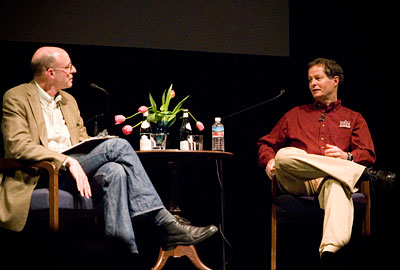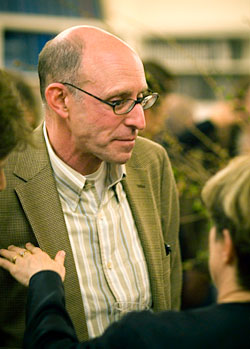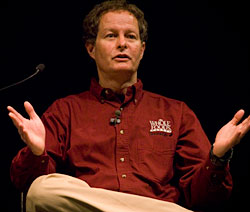UC Berkeley Web Feature
 |
John Mackey (right), founder and CEO of Whole Foods Market, talks about the "Past, Present, and Future of Food" with UC Berkeley journalism professor Michael Pollan. (Bart Nagel photos) |
Michael Pollan, Whole Foods' John Mackey usher Berkeley foodies into 'ecological era'
The answer has two parts. The speakers were not just any reporter or grocer, but Michael Pollan, best-selling science writer and UC Berkeley Knight Professor of Journalism, and John Mackey, founder and CEO of Whole Foods Market, the world's largest natural-foods grocery chain. And they have been carrying on a dialogue of sorts about the future of organic food ever since the publication last April of "The Omnivore's Dilemma," Pollan's investigation into the U.S. food chain.
In a chapter titled "Big Organic," Pollan wrote "a few slightly unflattering things" about Whole Foods, he told the Berkeley audience - somewhat of an understatement. Stung by Pollan's criticism, Mackey replied with a 25-page, single-spaced letter, kicking off an exchange of messages posted online.
Pollan invited Mackey to come to Berkeley to continue the conversation in public. To which Mackey replied, in effect, "How crazy do you think I am?" recalled Pollan, alluding to Berkeley's notoriously opinionated, anti-corporate contingent of "foodies." But in the end Mackey agreed, which Pollan said showed a "willingness to engage with his critics [that] sets him apart from just about every other CEO."
 'I'm very struck by what's going in the country around the food issue. I think what we're witnessing is not just a market, but a movement. A social reform movement, that has many dimensions... It's not just organic; it's just as much about animal welfare, fair trade, all these other dimensions.' -Michael
Pollan |
Mackey suggested that Tuesday's large and eager crowd was a result of the food-reform movement reaching a "tipping point, a critical consciousness level" that is both rapidly accelerating its growth and causing its ideology to fracture. Pollan's "brilliant" book, as Mackey called it repeatedly, is both a product of and a catalyst for that movement, whose early adopters included California's "back to the land" hippies, the 1969 garden-planting rebels of Berkeley's People's Park, and local, seasonal food promoter Alice Waters, class of '67 and founder of Chez Panisse. Many of these pivotal figures were in the audience, among them Waters and Bill Niman, whose humanely raised meat business, Niman Ranch, was built in the '70s with the assistance of UC Berkeley journalism dean Orville Schell.
The evening was billed as "The Past, Present and Future of Food," in honor of Mackey's presentation tracing humanity's relationship to food from the hunter-gatherer era to dawning of what he calls the "ecological era." In this new era, Mackey believes increasing numbers of consumers will reject the industrial values of high productivity and low commodity prices in favor of foods that are natural (not processed, and without synthetic additives), organic, local, and ethically and sustainably raised and traded.
Mackey's considerable challenge was to persuade Pollan and a skeptical audience that the company he founded in the '70s as Safer Way - and has patiently grown into a $5.6 billion-a-year, Fortune 500 business - still has the credibility and integrity to lead the food movement into this future.
As Mackey said in a Marketplace interview the day before the event, there's always been an ongoing battle in organics, between what he called "the purists and the pragmatists." Pragmatists like him "want to spread organics to as many people as possible," a growth strategy that often requires compromise, while "the purists are very mistrustful of it being corrupted by agribusiness and big corporations."
Struggle for the soul of organic
When Mackey asked how many in Zellerbach Hall had read "The Omnivore's Dilemma," two out of three people raised their hands. Eleven months after its release, it has sold 174,000 copies, according to Bookscan. Pollan's views on Whole Foods thus spread like canola seed through the consciousness of the very people most likely to shop there.
Pollan wrote about the frequent cognitive dissonance he experienced as a Whole Foods shopper, between the in-store signage and literature trumpeting small family farms (a genre he dubbed "Supermarket Pastoral"), and the reality of the large corporate industrial farms that he determined made up most of Whole Foods' suppliers.
"[T]o the extent that the organic movement was conceived as a critique of industrial values, surely there comes a point when the process of industrialization will cost organic its soul," he wrote.
 'After ["The Omnivore's Dilemma"] was published, it became kind of open season on Whole Foods. The media loves to build people up and then tear them down.' -John Mackey |
Since he had used 450 pages to present his take on the state of the food system, Pollan explained, he thought Mackey deserved a fair chance to present his. The Whole Foods' CEO did so with a 45-minute lecture comprising dozens of slides crammed with text and graphs. (Overheard in the audience: "I come to a food event for pie, not pie charts!")
Wearing a maroon Whole Foods button-down and what looked suspiciously like vegan Earth shoes, Mackey raced though the slides like a Ph.D. student presenting his dissertation. He traced the history of humanity's agricultural development from hunting and gathering (by far the longest-lasting era), to horticultural (planting fruits and vegetables), pastoral (raising animals for food), pre-industrial (in which slave labor permitted the growing of monocultures), and the present-day industrial era (in which machines, chemicals, and new technology have largely replaced human labor).
Some inconvenient truths about our food system
Industrial agriculture is primarily focused on increasing productivity and lowering costs, and "it's been amazingly successful," said Mackey. The system's major drawbacks are that it recognizes no values beyond those two, yet it has taken an enormous destructive toll on society: polluting the environment, guzzling fossil fuels, making Americans fat, and giving so many antibiotics to animals that their efficacy in treating humans is diminished.
It has also resulted in inhumane treatment of farm animals that borders on the barbaric. Mackey, who became a vegetarian several years ago after reading books recommended by animal-rights shareholders, showed the Zellerbach audience a five-minute video (produced by People for the Ethical Treatment of Animals and narrated by the actor Alec Baldwin) depicting horrific practices common to factory farms: overcrowding, the debeaking of chickens, dairy cows lamed by such brittle bones they can barely walk to their slaughter, hogs dying while in transport or even worse, not dying as they travel through the slaughterhouse assembly line.
Switching tactics, Mackey then attempted to cheer up the audience with positive changes that the ecological era might usher in as it attempts to correct the failings of the industrial era. Although Whole Foods almost singlehandedly developed the mass market for organic food, he said the company recognizes that organic no longer means what it originally did to consumers, and thus plans to lead the charge into the next phase, or "beyond organic." The beyond-organic buzzwords: local, ethical, sustainable, and humane.
Ask not what the food movement can do for you…
Whole Foods already has an Authentic Food Artisan program through which individual stores can recognize small local producers in their communities. Among the new initiatives that Mackey announced in his Berkeley appearance was a $30 million venture capital fund that Whole Foods will use to invest in small artisans producing unique regional foods. By helping the artisans preserve their traditions while accessing a global market, the fund would follow in the footsteps of the Slow Food movement started in Italy during the '80s.
Related articles: "Dark times": Eric Schlosser, Michael Pollan discuss a nation of fast food, cheap labor, and profit-driven compromises, NewsCenter, October 20, 2006 New book on the U.S. food chain provides few soundbites — but much to chew on, NewsCenter, April 11, 2006 Journalism School's Michael Pollan has a beef with McDonald's antibiotics announcement, NewsCenter, July 1, 2003 Factory food and its consequences, Berkeleyan, October 2, 2002 Window opens providing glimpse of how we raise cattle – and it's not a pretty picture, NewsCenter, January 26, 2004 |
In the next year, Mackey said, Whole Foods will also develop a tiered rating system for organic farms and meat producers. Simply meeting the USDA's certified-organic criteria would earn one star, but "practicing the highest levels of agroecological principles - you've got the healthiest soil, your workers are well treated, you've got exemplary animal welfare standards" - could earn five stars, he explained. The program would be administered by the same third-party organic certifiers who already vet the farms' practices, and he hopes it will branch out from Whole Foods to become a national system.
Under another new initiative, the Whole Trade Guarantee, Whole Foods would partner with Fair Trade and the Rainforest Alliance to evaluate the quality, price, labor practices, and environmental sustainability of imported foods. While the label initially will cover coffee, bananas, tea, chocolate, mangoes, rice, and pineapple, Mackey aims to have 50 percent of the chain's products from the developing world sold under the Whole Trade Guarantee within 10 years.
Mackey concluded his presentation with a plea for open-mindedness about food. First order of business: stop romanticizing the past and realize in food, "there was never a 'golden age' - they all had their problems," he said. He also implored the audience to avoid thinking of agriculture and food in simplistic terms of "good guys and bad guys."
"Look," he said, "Whole Foods has been doing this for 27, 28 years now, and we're going to keep doing this. The challenge I would put out to everybody here is, What are you going to do? What's your contribution going to be to help our planet evolve into the ecological era?"
Lightning up
What followed was frank talk about how Whole Foods' success had made the company "a lightning rod" for criticism about the organic food industry. "Do you worry that organic has suffered a crisis of consumer confidence?" Pollan started to ask.
"Yeah, thanks to you, buddy!" pounced Mackey. He was joking, but his subsequent remarks showed just how deeply he felt the bolts of criticism Pollan had directed his way. Pollan's intentions were good, he said, "and some of that truth needs to be heard. But . you exaggerated the extent of the industrialization of organic. Every place I turn I read about 'Big Organic,' 'Industrial Organic,' and while I don't deny that there's some of that going on, I don't think it's the normal state of affairs. I'm not ready to abandon organic as fatally flawed."
Turning the tables, Mackey asked Pollan for his vision of what changes should be made in the food system, and argued that "The Omnivore's Dilemma" had made already complex food choices more confusing.
"That was one of my goals, to complicate the decision," admitted Pollan. "Because right now, the decision is too simple for most Americans. For the people in this room who struggle with local vs. organic, or imported vs. local, or humane vs. being vegan, those are really hard, legitimate questions, and anyone who's struggling with them is halfway there.. I'm less interested in sending people down particular paths than in just making them think."
In contrast to previous public events, however, Pollan did go so far as to recommend a few policy changes, such as taking the millions of acres used to grow fossil-fuel-dependent corn for cattle and turning it back to solar-powered pasture to graze them on. And he agreed with Mackey that greater transparency all along the food chain, whether using bar codes that interested consumers could scan at kiosks in Whole Foods and say, watch live video from the farms, would be a major improvement that might eliminate the worst abuses of industrial agriculture.
In the end, diversity in business and the marketplace are just as important as biodiversity in agriculture, Pollan suggested. "I think we need 'supermarket organic' and I think we need 'farmers market organic.' We shouldn't be looking for the one right answer, and we shouldn't be demonizing answers that might not be, to our minds, perfect."
Whole Foods and its critics, even the sarcastic ones, are striving toward the same goals, Pollan said, and he commended Mackey for recognizing that a "certain public accountability" was implicit in Whole Foods' chosen area of the food sector.
For his part, Mackey seemed willing to let "supermarket pastoral" bygones be bygones. Just as he views competition as a way to make business better, by forcing companies to innovate or fail, critics can also be an ally.
"They're there to make you grow. And if you're not open to that, you're limiting the possibilities of your organization. It doesn't feel good to be criticized, but if you have some emotional maturity, you go away and you reflect on, 'What can I learn, what are they telling me that will help me be a better person and Whole Foods a better company?'" Mackey said, spreading his hands.

